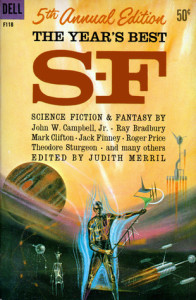Book Review: The Year’s Best S-F: 5th Annual Edition edited by Judith Merrill
This 1960 book features a selection of speculative fiction short stories published during the 1958-60 time period. Editor Judith Merrill provides an introduction about the concept of wonder, chatty introductions to each story (she doesn’t think much of Kingsley Amis as a literary critic) and an ending summary (as well as a listing of “honorable mention” stories.)
The 22 stories themselves begin with Damon Knight’s “The Handler”, which is a metaphor for Hollywood phoniness, and end with “Me” by Hilbert Schenk, Jr., a humorous poem about the difference between machines and humans (which is as of now, still true.)
The absolute standout in this volume is the original novella version of “Flowers for Algernon” by Daniel Keyes. Charlie Taylor, a man with developmental disabilities, volunteers for an experimental surgery that increases his intelligence. Told through Charlie’s own journal, the use of changing vocabulary, literary style and attitude is masterful. The dawning of a new intellectual world, the disappointment when Charles learns that being smart doesn’t in itself make you happier, and the sinking horror when he discovers that it’s all going away make for a powerful gut punch.
The story is also commendable for the sharply drawn minor characters, like Fanny Girden, who fears what has happened to Charlie and considers it evil, but refuses to sign a petition to fire him because discrimination is against her principles. The novel version is also excellent but contains more sexual content (sometimes published as Charly because of the Cliff Robertson movie.)
Also interesting is an editorial by John W. Campbell, Jr. titled “What Do You Mean…Human?” It asks the perennial question of what precisely the definition of “human” is, and how to explain it to something that is not human, such as an intelligent robot. The question remains open at the end, but it’s a good starting point for late night discussions.
“Mariana” by Fritz Leiber turns out to be about clinical depression, and a failed treatment program.
Mark Clifton’s “What Now, Little Man?” is a question about the nature of intelligence, and an uncomfortable look at colonialism.
“The Other Wife” by Jack Finney details how one man learned how to travel between alternate universes, and how he exploits this fact. Kind of sexist, as he doesn’t let either wife in on what’s going on, but decides for them that this is the best use of his time.
Most of the other stories are readable, but also a bit forgettable. As is common with books of this vintage, “World’s Best” means the English-speaking world at maximum, and there’s a heavy tilt towards white male protagonists. The New Wave hasn’t quite hit in this volume, although there is a hint of it in J.G. Ballard’s “The Sound Sweep” which focuses on the social effects of new acoustic technology.
Well worth looking up at your library or picking up if you see it at the used bookstore.

